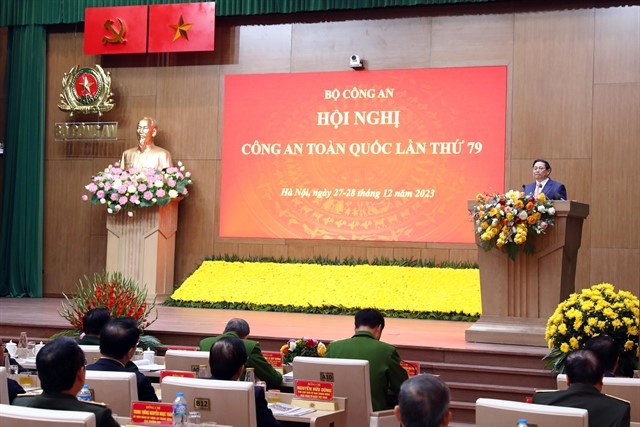
|
Getting your Trinity Audio player ready...
|
Prime Minister Phạm Minh Chính emphasised the need for public security agencies to adopt a proactive approach to understanding and forecasting situations to prevent unforeseen challenges related to strategy, political security, and social order and safety in 2024. This call to action came during the 79th Conference of Public Security convened by the Central Public Security Party Committee and the Ministry of Public Security.

In his remarks, PM Chính commended the achievements of the People’s Public Security forces, highlighting their contribution to administrative reform, e-government initiatives, and national digital transformation, underscoring the sector’s pivotal role in these endeavours.
The Prime Minister called for continued administrative reforms, adequate resource allocation, and investment in infrastructure and frontline forces within the public security sector.
In line with this, Prime Minister Pham Minh Chinh signed a directive demanding stricter adherence to information security regulations and enhanced level-based information system security measures. The directive underscored the critical role of level-based information system security, emphasising its alignment with the existing Law on Cybersecurity.
The PM asked ministers, heads of ministerial-level and Government agencies, Chairpersons of the centrally-run municipal and provincial People’s Committees, Chairs of the Boards of Directors and Members’ Councils, General Directors of State-owned corporations, groups, commercial State-owned banks, the Vietnam Development Bank, the Vietnam Bank for Social Policies, the Cooperative Bank of Vietnam and other State-owned credit and financial institutions nationwide to take direct responsibility for information security in their respective agencies or localities.
Under the directive, they were assigned to ensure that all operational information systems, ranging from level 1 to level 5, receive proper security clearance no later than this September. They would be held accountable to the PM and the law should any breaches or security incidents occur within their purview.
The Ministry of Information and Communications was tasked with issuing and disseminating a handbook on compliance with legal regulations and strengthening information system security according to the level. At the same time, it must strengthen inspection and examine compliance with information security regulations.
Other specific tasks were also assigned to IT security companies, telecom and Internet providers.
Vietnam has demonstrated successful cybersecurity initiatives, bolstering its digital resilience and safeguarding against cyber threats. OpenGov Asia reported that the country’s recent strides in cybersecurity have yielded promising results, with January witnessing a notable 33% decrease in cyberattacks compared to the previous month of December 2023.
This decline, coupled with a 23% decrease from the same period in the previous year, reflects the effectiveness of ongoing efforts by various agencies and units to bolster cyber safety and security across the nation’s information systems.
Notably, these initiatives have entailed increased investments in advanced monitoring systems, proactive problem-detection mechanisms, and robust warning systems, demonstrating a proactive approach to safeguarding against digital threats.
Despite these positive developments, information security experts continue to stress the imperative for agencies, organisations, and businesses to remain vigilant and proactive in ensuring information security.
Authorities advise comprehensive reviews and examinations of sensitive server devices before major holidays or campaigns, aiming to swiftly identify and eradicate any signs of potential attacks or malicious code, thus fortifying defences ahead of potential cyber onslaughts.
Moreover, as technology evolves, cybercriminals adapt their tactics accordingly, posing an ongoing challenge for both individuals and organisations. Essential cybersecurity practices, including maintaining cyber hygiene, regularly updating antivirus software, and educating users about potential risks, remain paramount.
By fostering a culture of proactive defence and continuous improvement, Vietnam endeavours to stay ahead of emerging threats, safeguarding critical data, infrastructure, and the overall stability of its digital ecosystem in an ever-evolving cyber landscape.
















